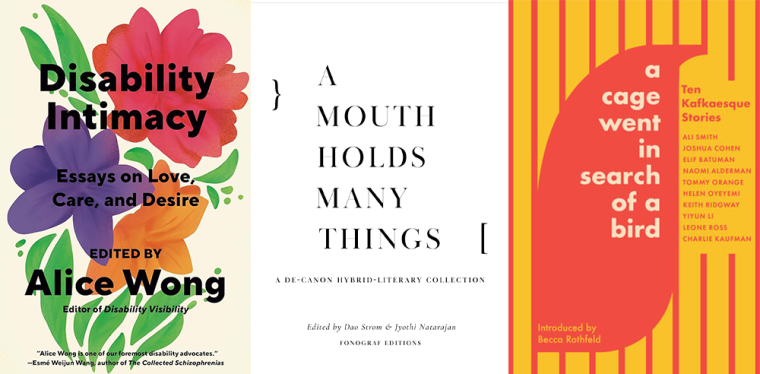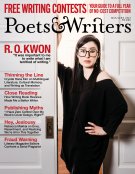Among the many new books published each season is a shelf full of notable anthologies, each one showcasing the work of writers united by genre, form, or theme. The Anthologist highlights a few recently released or forthcoming collections, including A Cage Went in Search of a Bird: Ten Kafkaesque Stories.

Heartful connection is the throughline linking the diverse range of original essays, poetry, and reprinted works collected in Disability Intimacy: Essays on Love, Care, and Desire (Vintage, April 2024). Whether addressing sex, parenthood, community organizing, queerness, or art, these writings—by authors who are navigating life with blindness, deafness, mobility challenges, and chronic illness—“will provoke and seduce” readers while reframing their understanding of what it means to be intimate with oneself and others, writes editor and disabled activist Alice Wong. Moya Bailey reflects on what it means to be a Black disabled doula, poet John Lee Clark offers a praise song for the sense of touch, Robin Wilson-Beattie considers BDSM, and Sarah Young Bear-Brown meditates on beadwork as an artistic practice that links her to her ancestors, among dozens of other selections. Wong describes Disability Intimacy as “a lifeline” during a particularly difficult time with her health in 2022, when her progressive neuromuscular condition took a turn for the worse. Her work curating and collaborating with contributing authors proved as crucial to her survival as the “ventilator and liquid nutrition flowing into my feeding tube,” she writes. “Reading the words on this page creates a dialogue, an intimate act bringing us together across space and time. May Disability Intimacy set your spirit on fire and send you on a voyage of self-discovery, destination unknown.”
Multiplicity is at the heart of any literary anthology, which seeks to capture many voices; yet the constraints of a single volume call for other limitations, such as theme or genre. A Mouth Holds Many Things: A De-Canon Hybrid-Literary Collection (Fonograf Editions, May 2024), doubles down on multiplicity by offering a compendium of hybrid literature by women and BIPOC writers that mixes language with image, performance, sound, and other mediums. In their editors’ note, Dao Strom and Jyothi Natarajan acknowledge the paradox of using “(only) pages and ink” to anthologize hybrid work, particularly when they aim “to unsettle the very tendencies toward ‘canon.’” A doorstopper at more than three hundred pages, A Mouth Holds Many Things includes lineated, concrete, and prose poetry alongside images of collages, textiles, performance photos, and digital compositions that create a dynamic reading experience. Contributors include Kimberly Alidio, Samiya Bashir, Gabrielle Civil, Victoria Chang, Diana Khoi Nguyen, Cindy Juyoung Ok, and thirty others. Reflections from contributors at the end of the book offer insight into their creative practices and attraction to hybrid literature. Poet Sasha Stiles writes: “For me, hybridity has everything to do with a posthuman near-future of networked inspiration and intertextual language and literature—not replacing what we know, but starting to write the next chapter.” Due to the recent closure of Small Press Distribution, the anthology is not available through online retailers; Fonograf Editions urges readers to purchase it directly from the press’s website.
Franz Kafka died in June 1924, at the age of forty, but his fables of absurd transformation, macabre punishments, and human venality are alive and well. Named for a cryptic line penned by Kafka in 1917, A Cage Went in Search of a Bird: Ten Kafkaesque Stories (Catapult, June 2024) marks the centennial of the writer’s death with contemporary tales inspired by his oeuvre. Naomi Alderman, Elif Batuman, Joshua Cohen, Charlie Kaufman, Yiyun Li, Tommy Orange, Helen Oyeyemi, Keith Ridgway, Leone Ross, and Ali Smith offer narratives of baffling circumscriptions, illnesses, miscommunications, and technologies. But the stories also make space for potentiality, with characters witnessing change or glimpsing future possibilities—putting Kafka’s turn-of-the-century disillusionment into conversation with our own. “Reading these ambivalent stories, I recalled Kafka’s notorious conversation with Max Brod about God, in which he proposed there is ‘no end of hope—only not for us,’” Becca Rothfeld writes in her introduction. “That is as much a happy statement as it is a bleak one.”








